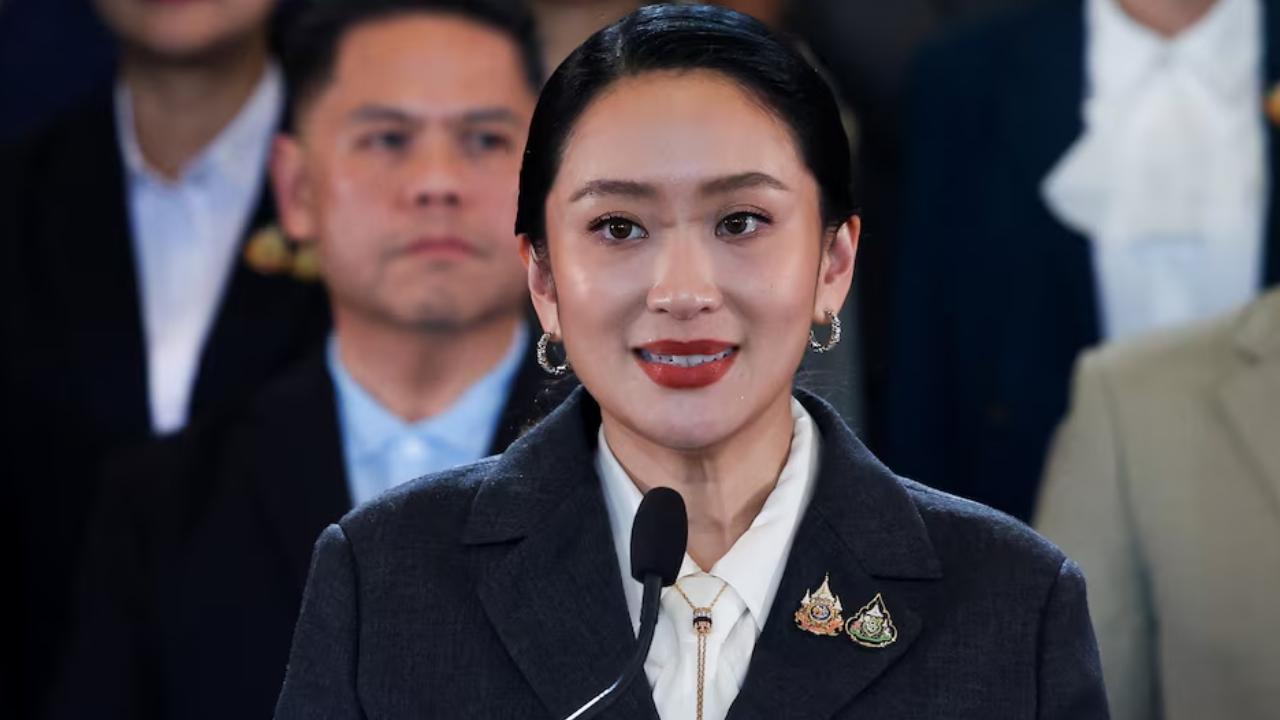
Post by : Monika
Photo: Reuters
Thailand's Constitutional Court has removed Prime Minister Paetongtarn Shinawatra from office due to an ethics violation. This decision is a major setback for the powerful Shinawatra political family, which has been a dominant force in Thai politics for decades. The court ruled that Paetongtarn placed personal interests above national concerns during a sensitive border conflict with Cambodia.
Background of the Case
The controversy started in June 2025 when a phone conversation between Paetongtarn and Cambodia's former leader, Hun Sen, was leaked to the public. In the call, Paetongtarn appeared to favor Hun Sen and criticized a well-known Thai general. Many people believed her actions compromised Thailand's sovereignty. This led to protests and widespread public anger.
Despite issuing an apology, the situation escalated. In July, a five-day border clash erupted between Thailand and Cambodia. The conflict involved fighter jets and artillery, marking the worst fighting between the two countries in more than ten years. The clash caused concern for both citizens and government officials, highlighting the seriousness of the situation.
Court's Ruling
On August 29, 2025, the Constitutional Court issued its final decision, voting 6-3 against Paetongtarn. The court stated that she had breached ethical standards by prioritizing personal relationships over national responsibilities. According to the court, her actions damaged Thailand’s reputation and weakened public trust in the government.
This decision makes Paetongtarn the sixth prime minister connected to the Shinawatra family to be removed from office either by judicial action or military intervention in the last twenty years. The Shinawatra family has faced numerous political challenges, and this ruling adds another chapter to their long and complicated history in Thai politics.
Political Implications
After the dismissal, Deputy Prime Minister Phumtham Wechayachai was appointed as the caretaker prime minister. The Thai parliament now has the responsibility to select a new prime minister. No exact deadline has been set for this process.
Several names have been suggested as potential candidates. These include Chaikasem Nitisiri, a former attorney general, as well as other political figures such as Anutin Charnvirakul and Prayuth Chan-ocha. The current ruling coalition holds a fragile majority in parliament, making it difficult to quickly elect a new leader. Political experts warn that negotiations and discussions could take time, adding to uncertainty in the government.
Public Reaction and Economic Impact
The court’s ruling generated strong reactions across Thailand. Many citizens expressed support for the decision, viewing it as an important step toward accountability in government. People applauded the court for upholding ethical standards for national leaders.
However, some citizens remain concerned about political instability. The removal of the prime minister adds uncertainty to the country’s governance, and many worry about how this could affect everyday life and government decisions.
The economy also responded to the news. Thailand’s stock market dropped, and the national currency weakened slightly after the announcement. Financial analysts warned that the political uncertainty could slow down economic reforms and discourage investment. This may have long-term consequences for Thailand’s economic growth and development if a stable government is not quickly established.
The removal of Paetongtarn Shinawatra highlights the ongoing challenges faced by the Shinawatra family in Thai politics. It demonstrates the importance of ethical conduct for national leaders and the role of the judiciary in upholding democratic principles.
As Thailand navigates this period of political uncertainty, the selection of a new prime minister will be a critical decision for the country. The choice of leader will influence both political stability and economic growth. Citizens, political analysts, and international observers will closely watch the developments in the coming weeks to see how Thailand manages this transition.
Paetongtarn’s removal is a reminder that leadership comes with responsibility and accountability. The nation now faces the task of ensuring that ethical standards and national interests are prioritized as new leaders step into power. How Thailand handles this moment will shape its political and economic future for years to come.
Paetongtarn Shinawatra










Alibaba Cloud Leads China’s AI Market with 36% Share
Alibaba Cloud captured over one-third of China’s AI cloud market beating rivals and investing billio

Cambodia Defends China’s Belt and Road as Economic Lifeline
Cambodia praises China’s Belt and Road projects, calling them vital for growth rejecting claims of d

Portugal Norway England shine in UEFA World Cup qualifiers
Portugal beats Hungary 3-2 Ronaldo scores Haaland shines for Norway, Kane leads England in dominant

PV Sindhu exits Hong Kong Open HS Prannoy Lakshya Sen win
PV Sindhu loses early at Hong Kong Open HS Prannoy and Lakshya Sen advance in tough battles India's

Iran Signs New Cooperation Deal with UN Nuclear Watchdog in Cairo
Iran agrees to a new framework with UN nuclear agency resuming controlled inspections after June’s c

Syrian man found guilty for deadly festival stabbing in Germany
A Syrian man inspired by IS was convicted for stabbing people at a German festival, killing three an